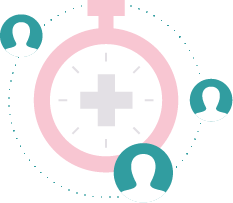November 24, 2020
For as long as they have existed, healthcare organizations have been making attempts to optimize various aspects of their operations, with varying degrees of success. Whether driven by bottom lines or improving outcomes, there’s a constant belief in healthcare that the work is never really done. But with so much on the line, it’s no surprise that the industry at large tends to lag behind with adapting to new technologies. For example, while 15% of companies in non-healthcare industries have gone digital, only 7% of healthcare and pharmaceutical companies have. Why is healthcare so much slower to react?
Years ago, businessperson and academic Regina Herzlinger explored the various barriers to innovation in healthcare. Each of the six barriers — industry players, funding, public policy, technology, customers, and accountability — played a clear role in the successes, failures, and pacing of innovation in healthcare. While each is worthy of its own exploration, perhaps none is more interesting to consider here at HealthITq today than accountability. Are healthcare leaders truly in the position of either getting something done right or getting something done quickly? If you ask us, the answer is no, not always.

Leveraging Today’s Workforce Trends
Within one decade, contractors and freelancers could realistically make up half of the workforce in the United States. To avoid writing off half of the country’s talent pool, companies will have to learn not only how to source that talent, but how to leverage this unique dynamic shift to improve outcomes. Independent talent might just be the key to innovation implementation breakthroughs in healthcare organizations. We know because we’ve seen it. Agile use of independent healthcare IT talent who possess specific skills and experiences allows for vertical and horizontal flexibility to meet both short- and long-term needs. Here are just a few reasons why your best asset might not be on your current payroll.

Healthcare IT Consulting
We agree that there is no need to rush major decisions, but at the same time, there’s no need for healthcare’s constant hesitance to commit. Today’s healthcare IT consultants come highly trained, uniquely experienced, and available on demand.

Short-term Healthcare IT Staffing
If healthcare is lagging behind, it’s going to take efficient project-based work to make up that lost ground. Today’s independent healthcare IT workforce is uniquely positioned to hit the ground running. Alleviate the need for lengthy onboarding by hiring expert talent with experience with your particular needs.

Healthcare IT Cost Savings
Not only do healthcare organizations stand to benefit from the innovations made available from contract workers, but there are also substantial cost savings associated with hiring independent talent. Organizations can save up to 30% while accessing high quality talent.
There is clearly a lot to like when it comes to independent talent. Perhaps one of the agreeable benefits is that it’s mutually beneficial to all parties. The gig economy is growing, and it’s driven in large part thanks to individuals who prioritize freedom and flexibility in their work. According to a recent survey, 1 in 2 employees plan to leave their current jobs for contract work in the next 5 years.
There is clearly a lot to like when it comes to independent talent. Perhaps one of the agreeable benefits is that it’s mutually beneficial to all parties. The gig economy is growing, and it’s driven in large part thanks to individuals who prioritize freedom and flexibility in their work. According to a recent survey, 1 in 2 employees plan to leave their current jobs for contract work in the next 5 years.
